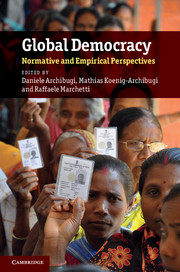Book contents
- Frontmatter
- Contents
- Figures
- Tables
- Notes on contributors
- Acknowledgements
- 1 Introduction
- 2 Models of global democracy
- 3 Citizens or stakeholders?
- 4 Is democratic legitimacy possible for international institutions?
- 5 Cosmopolitan democracy
- 6 Regional versus global democracy
- 7 Towards the metamorphosis of the United Nations
- 8 Flexible government for a globalized world
- 9 Global democracy and domestic analogies
- 10 Global democracy for a partially joined-up world
- 11 Civil society and global democracy
- 12 Global capitalism and global democracy
- 13 From peace between democracies to global democracy
- 14 The promise and perils of global democracy
- Index
- References
14 - The promise and perils of global democracy
Published online by Cambridge University Press: 05 June 2012
- Frontmatter
- Contents
- Figures
- Tables
- Notes on contributors
- Acknowledgements
- 1 Introduction
- 2 Models of global democracy
- 3 Citizens or stakeholders?
- 4 Is democratic legitimacy possible for international institutions?
- 5 Cosmopolitan democracy
- 6 Regional versus global democracy
- 7 Towards the metamorphosis of the United Nations
- 8 Flexible government for a globalized world
- 9 Global democracy and domestic analogies
- 10 Global democracy for a partially joined-up world
- 11 Civil society and global democracy
- 12 Global capitalism and global democracy
- 13 From peace between democracies to global democracy
- 14 The promise and perils of global democracy
- Index
- References
Summary
Why global democracy now?
Reading the chapters comprising this volume filled me with admiration for the conceptual and social science rigour, conceptual clarity and sophistication of the individual undertakings, for the illuminating depictions of several ways to frame global democracy as goal, process and vision, and, finally, for the attention given to transition pathways seeking to bridge the gap between global governance as of 2011 and some realization of global democracy at an undetermined, and undeterminable, future date. As such, these authors have delivered a superb intellectual tool with which to study present and future international relations from a normative standpoint specified by their shared preoccupations with global democracy. This is a notable pedagogic achievement as it lays claim to an alternative paradigm for study and research that is not completely state-centric, and yet at the same time cannot be dismissed as utopian or mere advocacy. In this respect, the orientation of this global democracy scholarly gathering can be described as proceeding from a post-Westphalian consensus that is fully sensitive to the resilience of sovereign states, and to their continuing prominence in almost any achievable global democratic polity.
As reader and sympathizer I believe there is a significant, and likely illuminating, issue present that does not seem to be raised: why has this interest in global democracy flourished now in the early twenty-first century, and rarely earlier except in the marginal literature of utopian critics of a politically fragmented world order that built security and national interests on the foundations of an ever more menacing and expensive war system. World federalists, dreamers and proponents of world government, were the most notable antecedents to the sort of less structurally and constitutionally driven models of global democracy found in the various chapters. Unlike these authors, world federalists were typically amateurs with regard to social science, and almost totally Western in outlook and prescription. Quite often world federalists were unabashedly seeking a world order that generalized the American experience with domestic federalism, relying for persuasion on an argumentative logic that was unduly confident about the mobilizing potential of common sense and rationality. It seems only slightly unfair to characterize such advocacy as a legacy of the Enlightenment, culturally provincial and lacking in mass appeal even in the West, and indifferent to the political obstacles that beset any path from the ‘here’ of war and sovereign states to the promised land of ‘there’.
- Type
- Chapter
- Information
- Global DemocracyNormative and Empirical Perspectives, pp. 274 - 284Publisher: Cambridge University PressPrint publication year: 2011



